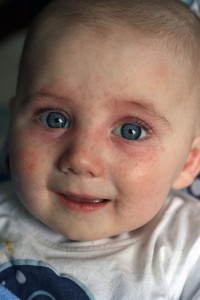Baby Allergies Information
Milk allergy and special formulas.
Milk allergy is a lot less common than most people think.
Young babies have many stomach complaints, but most are due to their immaturity rather than allergy truly allergic babies often have symptoms such as severe eczema, chronic nasal congestion and poor weight gain, and come from allergic families.

Breast-feeding is ideal for babies from allergic families, but for babies already on formula who have allergic troubles, you and your doctor or nurse practitioner may want to consider switching formulas your doctor is most likely to recommend a more specialized formula aimed at your baby’s special problems.
Laboratory tests can sometimes confirm milk allergy or a trial of milk can be given at some later time. Most children outgrow milk allergies by one to two years.
Parents may choose, however, to raise their children without milk or other dairy products for a variety of health reasons.
Allergic nose troubles, including hay fever.
You probably know people who have hay fever. When pollen gets in the wind, these people sneeze and their noses are stuffed up and itch and run. This is because the nose is allergic to the pollen, which doesn’t bother other people.
Some people have hay fever in spring because they are allergic to certain tree pollens, others during the summer months.
If your child has a running, itching nose that lasts for weeks at the same time every year, consult your doctor or nurse practitioner. Liquid medicines or tablets and nasal sprays can eliminate some of the sneezing and congestion.
The most effective treatment is to minimize exposure to the offending allergens: close the windows in the car and the house or at least the bedroom (air conditioners remove much of the Pollen), avoid parks and fields during pollen season and limit time outdoors on the days when the pollen count is highest. In the most severe cases of hay fever, injections may be recommended.
Hives
An allergic reaction can show up on the skin as raised red welts or blotches, often with a pale spot in the middle, that itch, sometimes unbearably. Hives are unlike most other rashes in that they often disappear in one spot then appear in another.
Sometimes it’s obvious that hives are in response to a specific food or medicine. Other triggers include heat, cold, plants, soaps or detergents, viral infections (including mild coldlike illnesses), even strong emotions.
Often, though, it’s impossible to tell what has set off the hives. A few individuals repeatedly get hives; many have them only once or twice in a lifetime. First aid is with an antihistamine, available over the counter. More powerful medicine is available by prescription.
On very rare occasions, hives are accompanied by swelling the inside of the mouth and throat and difficulty breathing (anaphylaxis).
If this happens, call an ambulance immediately. This is a medical emergency.
